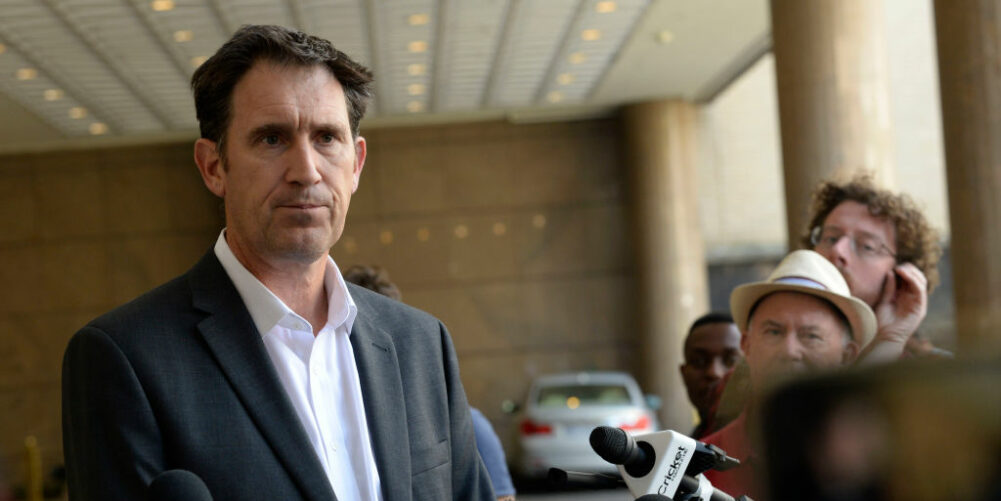(Photo: Getty Images)
By Adam Ellis
It took him three press conferences and several days of soul searching to say it, but finally James Sutherland acknowledged the C-word that most in the sporting world have been applying to the ‘Tampering Three’ – CHEATING.
I can understand why Sutherland was so reluctant. It is an emotive, inflammatory word, and one that certainly stirred the mob on social media to which he, Cricket Australia, and the country’s Prime Minister, Malcolm Turnbull, courted and eventually played.
Sutherland would have found it doubly hard because he too was once a first-class cricketer, briefly, for Victoria. As such, he’d have known that players view ball tampering with the “so what severity” of someone pinching paper clips from the office stationery cupboard. He no doubt feels a degree
of hypocrisy, then, handing out year bans for Steve Smith and David Warner and a nine-month one to rookie, Cameron Bancroft, who has also been told he will not be joining Somerset this summer, as had been the plan.
There is another reason behind Sutherland’s reluctance to use the C-word – commercial flight, and no, not that from airports. While expected that commercial deals and sponsors would start to fall away from the ‘tampering trio,’ with Asics already parting company with them, Australian cricket has not been immune from the fallout with Magellan, a finance house, having withdrawn its sponsorship after the ‘Cheat’ word was uttered.
Perhaps Sutherland, so scrupulous in not using the word previously, threw caution to the wind when he discovered the players had lied about the means by which they were tampering. Despite coming clean about their actions during the match, they had stuck to claims Bancroft had used sticky tape with soil on it to abrade the ball. For those of us who know how tough the leather on cricket balls is, this always sounded dubious, so when sandpaper was eventually admitted, some days later, it made more sense.
The instinct to lie when you are in a corner like that is as strong as panic overtakes clear, rational thought.
When Michael Atherton was hauled before the match referee during a Test against South Africa at Lord’s in 1994, for the infamous soil in the pocket affair, he lied, initially, about what he’d been up to on the field.
Later, Atherton confessed all and was fined £2,000 by Ray Illingworth, England’s head coach, half of which was for the lie, the other half for rubbing soil on the ball.


It is easily done and my own moment of denial with ball tampering came after a day’s play at Chelmsford in 1985, during Australia’s tour match against Essex. On a docile pitch I had decided to lift up the quarter seam to create a flap on the non-shiny side of the ball to mess with its aerodynamics.
To my slight surprise (these things didn’t always succeed) the response was immediate, the ball suddenly reverse-swinging in to the right-handers (though it was when I kept beating the outside edge of left-hander Greg Matthews that the umpires suddenly became interested).
When they saw the state of the ball, they changed it and demanded to see Graham Gooch, Essex’s acting captain, after play. Gooch knew what I’d been up to but when he asked the dressing-room, formally, who’d tampered with the ball, I could not bring myself to own up in front of team mates. Now maybe not everyone in the side had known that I’d fiddled with the ball, and if they did, that it was illegal under the Laws of cricket. But what makes me sceptical that only Smith, Warner and Bancroft knew about what was afoot in Cape Town, is that none of them were bowlers.
If you are going to get the ball to reverse-swing you’d think you might inform the bowlers and I find it unthinkable that they didn’t. Indeed, you’d assume most in the team would have an idea otherwise how would they know to throw the ball to Bancroft so he could work his voodoo with the yellow paper?
It seems to me that those punished have taken a bullet for the team. After all, Australia could scarcely ban the entire eleven as they’d never have been able to live that down.
Sympathy has been in short supply for the miscreants, largely because Australia are so unloved by other teams and their supporters. Yet their own have turned on them as well with all the vehemence of a true love spurned. Mind you, that says more about the Aussie public and their lionisation of sportsmen than Smith’s all to human foibles.
Even so, it would have taken a hard heart not to feel a smidgen of compassion for Steve Smith when he spoke at Sydney airport having arrived back home in high dudgeon. Although the words he spoke had a PR slickness, there was no disguising the emotion and remorse as he blubbed his way through the press conference.
A year’s ban seems incredibly harsh to a former cricketer like me for something low on the scale of wrongdoings. But there is a zealotry afoot in the world, able to mobilise quickly on social media, which deals in moral certainty, black and white, and not the very grey areas of things like altering the condition of a cricket ball.
You are either chump or champ; angel or devil; with us or against us, and woe betide anyone who falls in the middle as Smith, Warner and Bancroft did with their somewhat Baldrick-like plan to ball tamper.












